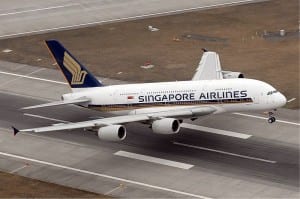
Over the years, Profs Stewart and Bingham in the School of Engineering at the University of Lincoln have been involved in many projects related to the Power Optimised (POA) or More Electric (MEA) Aircraft, primarily in the areas of advanced electrical machines and actuators, power electronic energy converters, and electrical power system design and optimisation.
For example, the EU FP6 MOET (More Open Electrical Technologies) was a 66.61 million euro Integrated Project of 62 European Partners from 15 countries composed of universities, research centres a broad range of aircraft, system and component manufacturers representing the whole supply chain who are ready to set up the PbW (Power by Wire) standard.
In line with the vision 2020, MOET aimed to establish the new industrial standard for commercial aircraft electrical system design, which will directly contribute to strengthening the competitiveness of the aeronautical industry. MOET will also contribute reducing aircraft emissions and improving operational aircraft capacity. Recent National and European research activities and state of the art commercial aircraft developments, have launched more advanced approaches for on-board energy power management systems. These benefits have also been recognised in North America where this is being given special consideration. A step change is necessary to remove current air and hydraulic engine off-takes and further increase the electrical power generation capability.
This in itself will require significant changes to current electrical generation and network techniques. After Fly by wire, the Power by Wire concept (PbW) will enhance aircraft design and use by power source rationalisation and electrical power flexibility. This will be achieved by developing the necessary design principles, technologies and standards.
Over a 3-year period, MOET project objectives were:
– Validate scalable electrical networks up to 1MW considering new voltages and advanced concepts including system transformation of future air, actuation and electrical systems into all electrical solutions,
– Assess the PbW concept integration at aircraft level considering a more composite environment and the interfaces with the avionics world,
– Build a design environment aiming to design and validate standardised solutions and a coherent set of platforms open to the full supply chain, in order to develop an optimised high performance PbW concept.
Lincoln:Engineering and the FP7 MAAT Advanced Airship
In addition to involvement in other work packages, from September 2011, Lincoln:Engineering will be leading the ‘Energy and Propulsive Systems’ work package.
This Work Package is related to the fundamental energy production and propulsion system. It will analyze and define the optimal propulsion both for cruiser and feeder airships focusing on innovative systems which can overcome the traditional limitations of traditional propellers at high altitudes. The purpose of the WP3 Energy and Propulsive Systems is to produce:
- parametric dimensioning methods for of the cruiser and feeder PV (photovoltaic) roofs
- design of a thermo-physical system which control the volume and the temperature of the gas ballonets even in presence of ample thermal gradients
- design of internal energy transport and distribution systems
- design of energy storage system (electrolytic hydrogen and oxygen) and conversion by fuel cells
- optimal propulsive systems design of cruiser and feeder, both for their common operative autonomous missions and for their integration inside the MAAT modular cruiser system.
